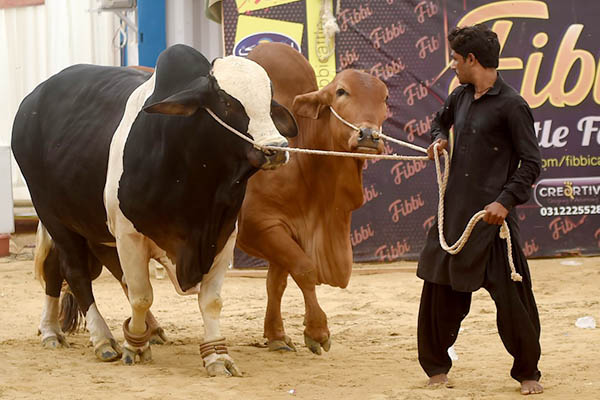
File photo of Eidul Azha. Rizwan Tabassum—AFP
The National Command and Operation Center (NCOC) on Tuesday issued guidelines for the upcoming Eidul Azha festival, stressing upon the public to adhere to the restrictions to curb the spread of coronavirus in the country.
In recent weeks, there has been a spike in new COVID infections nationwide, with officials of the National Institute of Health warning that it is the start of a new wave of the pandemic. Noting the threat of large gatherings for Eid—including in markets—they have warned that this could facilitate the spread of COVID.
The new guidelines issued by the NCOC are related to both the Eid prayers and the sacrifice of animals, and are as follows:
- Eidul Azha prayers should be organized in open spaces as much as possible. If prayers must be held inside mosques, administrators should ensure all windows and doors are kept open for proper ventilation to minimize the spread of the disease.
- Neighborhood mosques should organize prayers at a single venue with staggered timing to allow a maximum number of people to offer prayers in line with COVID-19 protocols.
- All ulemas who lead the prayers should deliver short sermons so people remain at the venue for the least amount of time possible.
- Young children, the elderly and unwell individuals should be discouraged from attending Eid prayers.
- No individuals should be permitted to enter prayer venues without face masks.
- There should be multiple entry and exit points at prayer venues to avoid overcrowding.
- Venue organizers should ensure the presence of hand sanitizers at all entry points and require all congregants to avail them prior to entering the prayer venue.
- Social distancing should be maintained during prayers by directing individuals to remain 6 feet apart
- People should be encouraged to perform ablution at home and also bring their own prayer mats
- The public should be discouraged from embracing and shaking hands after prayers to avoid chances of disease transmission and should be directed to disperse immediately after prayers
- Efforts should be undertaken by ulema to encourage collective sacrifices of animals through public, private and community organizations to reduce waste
- Provinces should launch awareness campaigns to educate the masses on the possible spread of COVID during meat distribution
- Slaughter sites should be designated away from residential areas to avoid crowding
Eidul Azha would be observed on July 10. The NCOC has noted that the annual animal sacrifice increases human contact, warning that this could boost the possibility of a super-spreader event for the new wave of the pandemic.
